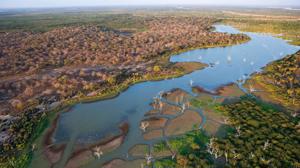5th Targeted Regional Workshop for GEF International Waters Projects and Partners in Africa

Together with our partners from the International Commission for the Protection of the Danube River (ICPDR), International Institute for Applied Systems Analysis (IIASA), the Nature Conservancy (TNC), World Wildlife Fund (WWF), United Nations Economic Commission for Europe (UNECE) and the United Nations Industrial Development Organization (UNIDO), we delivered a workshop dedicated to Water, Energy, Food and Ecosystems Nexus, Groundwater Governance, Legal and Institutional Frameworks, Sustainable Financing and Attracting Investment, Economic Valuation and Water Funds.
The overall aim of the workshop was to raise capacity and awareness among GEF IW projects and partners on aspects of:
- The services offered by GEF IW:LEARN, including the features of the Spatial Lab, and compelling story writing;
- The challenges of water management for energy and food production, while sustaining environmental flows;
- Legal and institutional aspects of a functioning international RBO;
- Key challenges for establishing an international RBO and for sustaining transboundary cooperation among the participating countries;
- Essential steps to make GEF IW projects attractive for the participation of and investment by the private sector;
- Economic valuation and how it can be integrated into the Transboundary Diagnostic Analysis/Strategic Action Programme process to inform decision-making;
- Water Funds and their application
At the end of the workshop, participants:
- Became familiar with the GEF IW:LEARN services, including the benefits of the Spatial Lab to their projects, visualising their project data in attractive maps, and writing a compelling story using the “inverted pyramid” methodology;
- Learned how to balance increasing water demand and solve water-supply conflicts between different sectors and countries;
- Expanded their knowledge and skills to set-up and to improve the legal and institutional framework of their institutions;
- Were able to assess the key aspects of legal and institutional cooperative frameworks for shared water systems;
- Were able to apply the essential steps for attracting investment;
- Were able to apply the tiered approach on economic valuation of “wet” ecosystem services in a transboundary project context;
- Understood what a Water Fund is and how elements of the model (whether scientific, public-private governance, or sustainable finance) could be adapted to meet their source water protection and restoration needs.

























